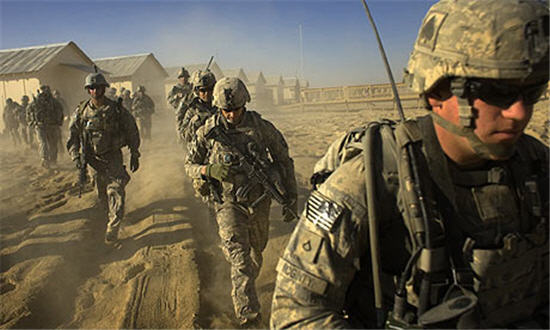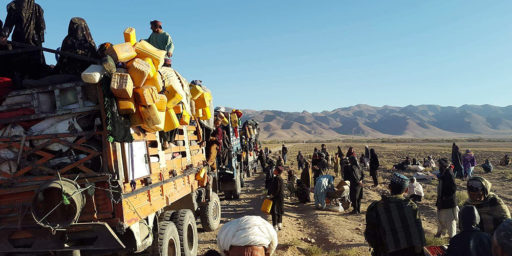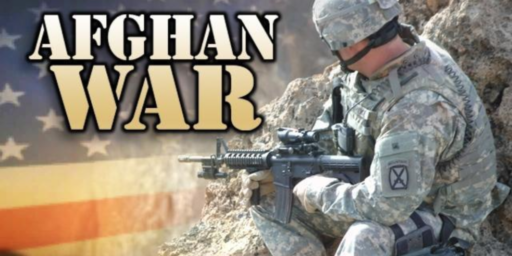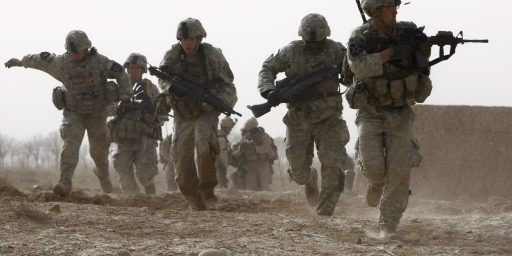Quietly, Obama Decides American Forces Will Continue To Engage In Combat In Afghanistan After 2014
You thought the American combat role in Afghanistan would end on December 31st? Think again.
Notwithstanding previous reports, and promises, that the American troops that well be left behind in Afghanistan after the end of the year will be involved primarily in training Afghan forces, The New York Times reports that President Obama has quietly expanded the role of those forces to allow them to participate in combat missions on a more frequent basis:
WASHINGTON — President Obama decided in recent weeks to authorize a more expansive mission for the military in Afghanistan in 2015 than originally planned, a move that ensures American troops will have a direct role in fighting in the war-ravaged country for at least another year.
Mr. Obama’s order allows American forces to carry out missions against theTaliban and other militant groups threatening American troops or the Afghan government, a broader mission than the president described to the public earlier this year, according to several administration, military and congressional officials with knowledge of the decision. The new authorization also allows American jets, bombers and drones to support Afghan troops on combat missions.
In an announcement in the White House Rose Garden in May, Mr. Obama said that the American military would have no combat role in Afghanistan next year, and that the missions for the 9,800 troops remaining in the country would be limited to training Afghan forces and to hunting the “remnants of Al Qaeda.”
The decision to change that mission was the result of a lengthy and heated debate that laid bare the tension inside the Obama administration between two often-competing imperatives: the promise Mr. Obama made to end the war in Afghanistan, versus the demands of the Pentagon that American troops be able to successfully fulfill their remaining missions in the country.
The internal discussion took place against the backdrop of this year’s collapse of Iraqi security forces in the face of the advance of the Islamic State as well as the mistrust between the Pentagon and the White House that still lingers since Mr. Obama’s 2009 decision to “surge” 30,000 American troops to Afghanistan. Some of the president’s civilian advisers say that decision was made only because of excessive Pentagon pressure, and some military officials say it was half-baked and made with an eye to domestic politics.
Mr. Obama’s decision, made during a White House meeting in recent weeks with his senior national security advisers, came over the objection of some of his top civilian aides, who argued that American lives should not be put at risk next year in any operations against the Taliban — and that they should have only a narrow counterterrorism mission against Al Qaeda.
But the military pushed back, and generals both at the Pentagon and in Afghanistan urged Mr. Obama to define the mission more broadly to allow American troops to attack the Taliban, the Haqqani network and other militants if intelligence revealed that the extremists were threatening American forces in the country.
The president’s order under certain circumstances would also authorize American airstrikes to support Afghan military operations in the country and ground troops to occasionally accompany Afghan troops on operations against the Taliban.
“There was a school of thought that wanted the mission to be very limited, focused solely on Al Qaeda,” one American official said.
But, the official said, “the military pretty much got what it wanted.”
Not only did the military get what it wanted, of course, but it got what it wanted in relative silence thanks to a decision that was made behind closed doors, with no public debate, and not even an open acknowledgment of the change in policy to the public. Instead, we get a short piece in the Times on a Saturday before Thanksgiving when most people are unlikely to be paying much attention, or if they are paying attention to the news, it will likely be to items such as the debate over the President’s immigration policies, the wait for a Grand Jury verdict in Ferguson, Missouri, and other news items. At some point in 2015, most likely, we’ll near a news item about an American soldier killed in combat in Afghanistan and many Americans will wonder what the heck happened to the President’s announcement that our combat role in America’s longest war was finally coming to an end, and when and why the decision was made. Once again, they’ll find a media that has failed them and an Administration that didn’t really care to make public a decision it knew would like be controversial.
In any case, the basis for the decision to essentially continue the longest war in American history is based largely on events in other countries:
American officials said that while the debate over the nature of the American military’s role beginning in 2015 has lasted for years, two issues in particular have shifted the debate in recent months.
The first is the advance of Islamic State forces across northern Iraq and the collapse of the Iraqi Army, which has led to criticism of Mr. Obama for a military pullout of Iraq that left Iraqi troops ill-prepared to protect their soil.
This has intensified criticism of Mr. Obama’s Afghanistan strategy, which Republican and even some Democratic lawmakers have said adheres to an overly compressed timeline that would hamper efforts to train and advise Afghan security forces — potentially leaving them vulnerable to attack from Taliban fighters and other extremists in the meantime.
This new arrangement could blunt some of that criticism, although it is also likely to be criticized by some Democratic lawmakers who will say that Mr. Obama allowed the military to dictate the terms of the endgame in Afghanistan.
The second factor is the transfer of power in Afghanistan to President Ashraf Ghani, who has been far more accepting of an expansive American military mission in his country than his predecessor, Hamid Karzai.
According to a senior Afghan official and a former Afghan official who maintains close ties to his former colleagues, in recent weeks both Mr. Ghani and his new national security adviser, Hanif Atmar, have requested that the United States continue to fight Taliban forces in 2015 — as opposed to being strictly limited to operations against Al Qaeda. Mr. Ghani also recently lifted the limits on American airstrikes and joint raids that Mr. Karzai had put in place, the Afghan officials said.
The new Afghan president has already developed a close working relationship with Gen. John F. Campbell, the allied commander in Afghanistan.
(…)
One senior American military officer said that in light of Mr. Obama’s decision, the Air Force expects to use F-16 fighters, B-1B bombers and Predator and Reaper drones to go after the Taliban in 2015.
“Our plans are to maintain an offensive capability in Afghanistan,” he said.
The officer said he expected the Pentagon to issue an order in the next several weeks detailing the military’s role in Afghanistan in 2015 under Operation Resolute Support, which will become the new name for the Afghanistan war.
The Pentagon plans to take the lead role in advising and training Afghan forces in southern and eastern Afghanistan, with Italy also operating in the east, Germany in the north and Turkey in Kabul.
But by the end of next year, half of the 9,800 American troops would leave Afghanistan. The rest would be consolidated in Kabul and Bagram, and then leave by the end of 2016, allowing Mr. Obama to say he ended the Afghan war before leaving office.
On some level, I am not sure what events in Iraq and Syria have to do with American policy in Afghanistan. From the beginning the tactical and strategic situations on the ground in the Afghan War have been fundamentally different from those at play in the War In Iraq that started with the American invasion in 2003. More importantly, the political issues and the players in the two countries have always been quite different, which is one reason why it always seemed odd to apply the logic of the 2006-2007 Iraqi surge to the situation in Afghanistan in 2010, and the different outcomes of those policies in the two conflicts seems to bear out the warnings of those that it was a mistake to make analogies between two very different situations. In this case, that warning would make even more sense because the odds of an ISIS-like threat arising in Afghanistan the same way it has in Iraq and Syria. The more likely outcome, as it has always been, is a breakdown in central authority that leads to a rise in Taliban power in the provinces, but that’s a battle that the Afghans have been fighting for the better part of the past thirteen years, and its one that they are going to have to find a solution to on their own rather than by relying on American troops to fight their battles for them. Indeed, its no surprise that the new government would be eager to have increased American help. President Ghani doesn’t seem to be nearly as irrational and erratic as Hamid Karzai was in his decision making, and it’s entirely rational for him to want American assistance in the fight against the Taliban. In the end, though, this is a battle that the Afghan people will have to fight and win for themselves, and it seems like a bad idea to have them continuing to rely on American assistance.
The counterargument, of course, is that American troops are only going to be in the country for the next two years. It’s worth noting, however that this is just current policy, just as it was supposed to be current policy that American troops would not be engaged in combat after December 31st, 2014. Until the last American soldier leaves Afghanistan, I would not trust any assurance that the withdrawal is actually going to happen, especially given the ease and silence with which this change in policy has been made.





I opposed the 2009 Afghan Surge and was arguing before then that we’d accomplished all we reasonably could there and should therefore end the mission.
The problem has always been—and the rise of ISIS has exemplified this—what happens next? What does a resurgent Taliban do in Afghanistan and regionally? And what responsibility does the US have, after having shaped regional politics so dramatically for so many years? The counterargument, of course, is that that question will be there if we leave in six weeks or six years.
I don’t like turning these questions over to the military brass because, once troops have died, accomplishing the mission becomes an emotional imperative. But one can certainly sympathize with their not wanting their hands tied. It makes little sense to continue an American military presence in a war zone and yet forbid them from engaging in combat functions.
It makes little sense to continue an American military presence in
athis war zone …I fixed that last sentence for you.
@James Joyner:
I do tend to agree there, which is why I kind of find the post-hoc arguments about how everything in Iraq would have been fine if we’d left a small residual force behind. A small number of troops there likely would not have changed the situation on the ground, and it’s unlikely to do the same in Afghanistan.
I am concerned that decisions like this are being made quietly, and basically included as part of a Friday Afternoon News Dump, though.
@edmondo: That’s been my position for five or six years. But it’s not been our policy or NATO policy. If we’re staying, the ROE ought make sense.
The lede is buried here…there is new leadership and they want our help.
OK. This still pisses me off.
I see no immediate threat to the US here…and limited potential threat.
As for public debate…with who? Republican clowns? What’s the point of bothering?
I absolutely do not support this…but not because the party of stupid wasn’t consulted.
@C. Clavin:
As I said, of course they want us to help fight their battles for them. Who wouldn’t want that?
That doesn’t mean we should say yes, though.
I wonder what the objective is?
This is a golden opportunity for Republican legislators to show their opposition to Obama’s unilateral governance. Introduction of a bill to bring our forces home followed by a vigorous open debate on the floor of Congress would be salutary. Unless, of course, the Republican leadership has no plans for actual leadership.
@Dave Schuler:
The objective? Why, to provide sufficient stability to allow Ghani and his relatives to loot some small percentage of what Karzai did.
@Slugger:
I’m sure they intend to lead. Already they’ve led the opposition to the immigration order by instantly going on vacation for more than a month. Credit where credit is due, that’s some quick-reacting leadership right there.
As long as the current leadership gets its bags of cash from the US like Karzai did…
Obama – (In the voice of Eric Cartman) “Whatever, I do what I want.”